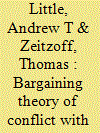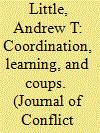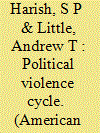| Srl | Item |
| 1 |
ID:
154543


|
|
|
|
|
| Summary/Abstract |
Bargaining models play a central role in international relations, particularly in the study of conflict. A common criticism of this approach is that it fails to account for nonmaterial (e.g., psychological) factors that may influence the bargaining process. We augment a standard bargaining model by allowing actors’ preferences over conflict to diverge from the “fitness” payoffs (e.g., resources) typical of such models. Preferences are subject to evolutionary forces—those who attain high fitness reproduce more. We find that (1) there is a trade-off where being “irrationally” tough leads to better bargains but also more inefficient conflict; (2) actors develop behavioral biases consistent with empirical findings from psychology and behavioral economics; and (3) these behavioral biases inevitably lead to conflict. By bridging the strategic and psychological approaches to conflict, our models provide new insights into questions such as how changes in military and intelligence-gathering technology affect the likelihood and expected cost of war, and how to interpret the purported decline of violence over recent human history.
|
|
|
|
|
|
|
|
|
|
|
|
|
|
|
|
| 2 |
ID:
150996


|
|
|
|
|
| Summary/Abstract |
This article proposes a theory of coups that centers around coordination and learning. The military is modeled as many officers who only want to join a coup if others join as well (i.e., coordination). If the current regime has survived past coup attempts, it is common knowledge that it is relatively strong (i.e., learning). Combining these effects, once the regime survives the first period, officers know that the regime is strong enough that they may refrain from staging a coup—regardless of how dissatisfied they may become with the status quo—under the mutually enforcing expectation that no other officer will rebel. The model has other equilibria where coup attempts can occur after the first period, allowing for more detailed empirical predictions. The analysis highlights several reasons why new regimes are prone to coups, but among regimes surviving the initial turmoil, structural factors that would seem to predict coup attempts can have an ambiguous effect. The model also makes novel predictions about how the “initial conditions” of a regime as well as what kinds of changes to payoffs affect the likelihood of coups.
|
|
|
|
|
|
|
|
|
|
|
|
|
|
|
|
| 3 |
ID:
153778


|
|
|
|
|
| Summary/Abstract |
Elections are often violent affairs, casting doubt on the canonical claim that democracy makes societies more peaceful by creating nonviolent means to contest for power. We develop a formal argument to demonstrate that this conclusion is incorrect. Holding elections has a direct effect of increasing levels of violence close to the voting, as this is when electoral violence can influence political outcomes. Precisely for this reason, elections also have an indirect effect of decreasing levels of violence at all other times, as parties can wait for the election when their efforts are more likely to succeed. The direct and indirect effects generate a “political violence cycle” that peaks at the election. However, when the indirect effect is larger, politics would be more violent without elections. When elections also provide an effective nonviolent means to contest for power, they unambiguously make society more peaceful while still generating a political violence cycle.
|
|
|
|
|
|
|
|
|
|
|
|
|
|
|
|